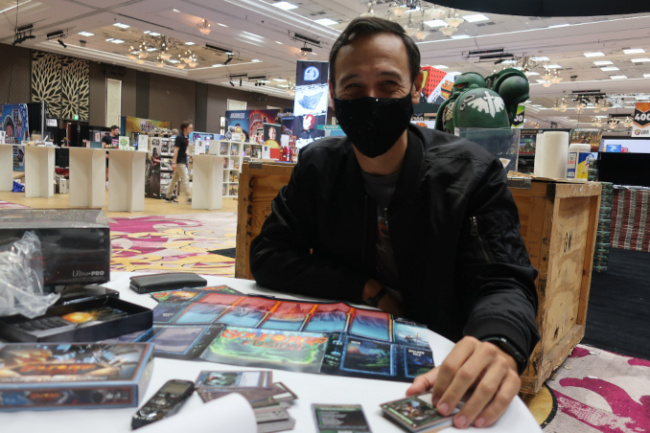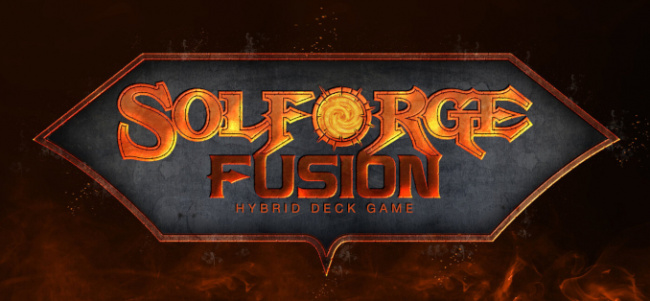We caught up with Stone Blade Entertainment CEO Justin Gary at GAMA Expo to find out more about SolForge Fusion, the new game he designed with Richard Garfield that’s headed for a trade release in Q2 (see “’SolForge Fusion’ Gets Retail Release“).
ICv2: What kind of game do you call SolForge Fusion?
Justin Gary: It’s a hybrid deck game.
SolForge Fusion is the new embodiment of the game SolForge. It was created by Richard Garfield and myself. It is a hybrid deck game, as I mentioned. What that means is that every single deck that you ever open in a pack is going to be 100 percent unique. They’re all algorithmically generated.
It’s called hybrid for two reasons. One, because you can shuffle any two of these decks together to customize the deck that you want to play. Two, because every single deck can be scanned into your online collection and played remotely via Tabletop Simulator. So it is a hybrid physical‑digital game and it’s a hybrid game in which you combine two decks together to play.
How many different cards were made?
That’s a great question. Our decks are algorithmically generated, meaning every single deck you get will be a one‑of‑a‑kind, no one else has the same thing. Our cards are also algorithmically generated, so in set one alone, there are 25,000 possible cards that can show up.
That’s just with Set 1. That number’s going to increase exponentially. We’ve done this in a really clever way because every card basically is a combination of card fragments.
For example, a Camouflaged Wartusk is one type of card and a Mystical Bear is another type of card, but you could also see a Mystical Wartusk or a Camouflaged Bear, and you would know what those powers mean as they come together. It makes it easier to talk about the game and understand it, but with an incredible number of permutations.
One of the things that’s exciting is we’ve built it so that you can drive a lot of collectability around this. Not only do we number every deck uniquely so you know where in the print run your deck was made, but we also number every card individually so you’ll know the number of times that that card was ever printed by the time yours got done.
For example, in our Kickstarter run, we have about 50,000 decks that we’ve printed so far, and of the 50,000 decks, there’s still less than 4,000 of the possible cards have been printed at all. There’s still 21,000 number ones out there that are yet to be discovered. This is really cool collectability element, where you can hunt down the exciting first times you’ve ever seen a card.
That number varies depending on the card?
Obviously, different cards have different rarities, and some of them are going to show up more often than others. Some cards are going to obviously be common, you’ll see a lot of them. Some cards are very, very rare combinations. Again, it may be years before one of them gets printed.
What’s the initial product range?
The Starter Kit retails for $34.99. It comes with four of the faction decks. Remember you can combine any two faction decks together to create your fused playable decks. Out of the box, two players can play.
It also comes with two playmats. It comes with a bunch of minion creatures (those are our little token creatures that can be summoned) and tracker cards, that help you track when creatures get damaged or get bonuses. It’s got everything that is needed for two players to play.
Our Booster Kits, which are the repeat purchase item that we’re expecting people to buy most of, is four decks and it’s $29.99 without the other accessories, because once you have those, you don’t need to re‑buy them.
Again, just to reemphasize, every single deck, whether from a starter, booster, whatever, every single deck is one‑of‑a‑kind, and can be mixed and matched with any other. Every time you buy more stuff, you have exponentially more permutations to play with.
Can you describe the play?
The heart of SolForge (the original game back in the day), and the heart of SolForge Fusion is the fact that cards level up as you play them. When you get a card, it starts out as level one, and when you play it, you actually go get the level two version from your side deck and then add it into your deck.
When you play the level one Camouflaged Wartusk, now you’ll get the level two version into your discard pile. The level two version, of course, is more powerful. Same thing when you play the level two, you go get the level three. Every three turns, you reshuffle your deck, and so you start getting access to your higher, more powerful cards.
One of the fun things to do is we can tell these cool stories, like a dragon egg turns into a dragon whelp, turns into a giant fire‑breathing dragon.
We can also balance the game because there’s no mana or traditional resource system, but the fact that I have a card that maybe is really, really good at level one but it levels less well, so it’s going to be weaker later on or vice versa. Maybe that dragon egg is pretty bad, but if I’m willing to invest in it over time, I can get this giant dragon and it’s totally worth it, so it creates really fun dynamics to play.
The board you see here is broken up into five lanes. It’s lane‑based combat, so whenever I play a creature, I place it into one of the lanes. It will automatically attack whatever’s across from it. If there’s nothing across from it, then it’ll attack the opponent directly. Both players start at 50 health. The first one to knock their opponent down to 0 wins the game.
How long does that take?
30 minutes once you know what you’re doing, 45 minutes to an hour if you don’t.
The board comes in the Starter Kit, but not in the Boosters?
Not in the Booster, correct, the Booster is just decks only.
You told us how many cards there were. How many different pieces of art are there?
I think it’s like 180 pieces of art in the first set, and then, again, we have more and more that are coming as we go. You’ll see that basically the noun parts of the names, so Wartusk, Bear, Ranger, Delver, those are all tied to the piece of art and then the modifier, adjective, Camouflaged, Shardplate, Shifting, Mystical, that changes the nature of the card, but doesn’t change the art.
Source: ICv2


